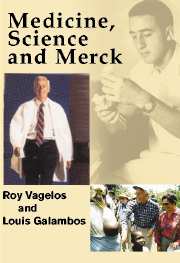Book contents
- Frontmatter
- Contents
- Preface
- 1 The Making of a Physician
- 2 Hot Science in Big Government
- 3 The French Alternative
- 4 The Research University – American Style
- 5 Turning the Corner at Merck
- 6 Crisis
- 7 Blockbusters
- 8 On-the-Job Training
- 9 Global Aspirations
- 10 The Moral Corporation
- 11 Getting to Know the Clintons
- 12 Partners
- Index
4 - The Research University – American Style
Published online by Cambridge University Press: 30 July 2009
- Frontmatter
- Contents
- Preface
- 1 The Making of a Physician
- 2 Hot Science in Big Government
- 3 The French Alternative
- 4 The Research University – American Style
- 5 Turning the Corner at Merck
- 6 Crisis
- 7 Blockbusters
- 8 On-the-Job Training
- 9 Global Aspirations
- 10 The Moral Corporation
- 11 Getting to Know the Clintons
- 12 Partners
- Index
Summary
Back on a familiar path at NIH, I quickly settled in with my growing team as we pressed on with the research on biosynthesis. Al Alberts and Peter Goldman were now joined by Phil Majerus, a scientist of enormous intellectual capacity. Phil, who was one of the smartest people I had ever met, was able to understand new concepts and master new techniques faster than almost everyone else. When he joined our laboratory, we had determined some of the characteristics of the acyl carrier protein (ACP), which is linked to various biochemical intermediates in fatty acid synthesis. Phil, Al, and I were now able to isolate a pure form of ACP and to establish that all the intermediates involved in fatty acid synthesis are bound to this single protein.
Majerus next wrestled with defining the structure of ACP, which would give us additional clues as to how it functions in fatty acid synthesis. We knew we had a protein to which all of the biosynthetic intermediates were attached, but we couldn't be certain of its function until we clearly established its composition and structure. All the while we were looking nervously over our shoulders, fearful that Harvard's Konrad Bloch or some other giant was going to beat us to the solution.
For a time, second best seemed a likely outcome after Phil, Al, and I embarrassed ourselves in front of what seemed like a million talented scientists.
- Type
- Chapter
- Information
- Medicine, Science and Merck , pp. 74 - 105Publisher: Cambridge University PressPrint publication year: 2004



